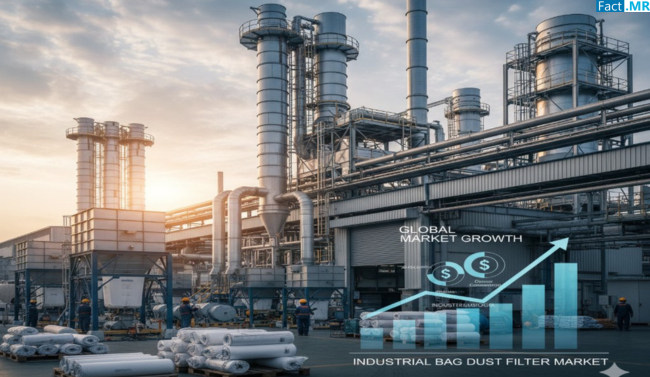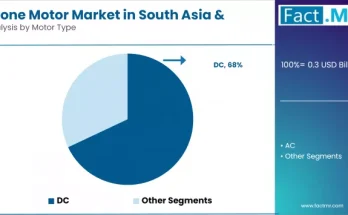Industrial bag dust filters are essential components of air control systems that separate and collect dust generated during various industrial processes. As industries continue to expand globally, the significance of maintaining clean air in workplaces has become increasingly important. Industrial bag dust filters not only protect the health of workers but also ensure operational efficiency of machinery by preventing dust accumulation. Their application spans diverse sectors, including construction, mining, chemical processing, oil & gas, power utilities, and pharmaceuticals.
The rising awareness of environmental standards, coupled with stringent government regulations, has pushed industries to adopt effective dust control measures. Industrial bag dust filters have emerged as critical solutions for dust management, providing enhanced air quality while complying with workplace safety standards.
Market Overview
The industrial bag dust filter market is witnessing robust growth due to the increasing demand for workplace safety and pollution control. These filters are designed to trap dust particles generated during industrial operations, thereby preventing environmental contamination and protecting machinery from wear and tear.
Technological advancements, such as hybrid electrostatic filters and nanofiber filter media, have significantly improved the efficiency and effectiveness of dust filtration systems. These innovations reduce re-entrainment of dust particles, enhance filtration rates, and provide longer service life. Moreover, intelligent monitoring systems and advanced filter cleaning mechanisms have contributed to optimizing performance and reducing maintenance costs.
Key Market Drivers
Several factors are driving the growth of the industrial bag dust filter market:
- Regulatory Compliance: Governments worldwide have implemented strict regulations on workplace safety and environmental protection. Industries are mandated to maintain air quality standards to protect workers from hazardous dust exposure.
- Worker Safety: Dust particles generated during industrial activities can pose severe health risks. Industrial bag dust filters help mitigate these risks, ensuring a safer work environment.
- Industrial Growth: Expanding industrial activities in sectors such as cement, chemicals, food processing, and pharmaceuticals are increasing the need for effective dust control solutions.
- Technological Innovation: Advanced filtration technologies, including hybrid filters, nanofiber media, and automated cleaning systems, are enhancing filter performance and efficiency.
- Environmental Awareness: Companies are increasingly focusing on sustainable operations, reducing pollution, and adhering to corporate social responsibility initiatives, driving the adoption of dust filtration systems.
Regional Insights
The adoption of industrial bag dust filters varies across regions based on industrial activity, regulatory frameworks, and technological advancements.
- North America: The region prioritizes worker safety and environmental compliance, with industries actively deploying dust filtration systems. Regulatory requirements play a significant role in driving adoption.
- Europe: Stringent environmental and workplace safety regulations contribute to the steady growth of the market. Advanced manufacturing facilities in countries like Germany, the UK, and France are leading in implementation.
- Asia-Pacific: Rapid industrialization in countries such as Japan, South Korea, China, and India has fueled demand for industrial bag dust filters. The expansion of construction, mining, and manufacturing sectors has made Asia-Pacific a key growth market.
- Other Regions: Middle East, Africa, and Latin America are gradually increasing adoption, driven by infrastructural development and stricter environmental norms.
Market Segmentation
The industrial bag dust filter market can be segmented based on filter type, cleaning mechanism, and end-use industry.
- Filter Type: Various materials are used to manufacture bag dust filters, including cotton, fiberglass, polyester, nylon, PTFE, polyamide, aramid, PPS, and polyimide. The choice of material impacts filtration efficiency, durability, and suitability for specific industrial applications.
- Cleaning Mechanism:
- Reverse Air: Utilizes a gentle air pulse to clean filter bags, enhancing performance and extending service life.
- Pulse Jet: Delivers short bursts of compressed air to dislodge accumulated dust from filter media.
- Shake Type: Manually or mechanically shakes the filter bags to remove dust particles.
- End-Use Industry: Industrial bag dust filters are widely used in construction, mining, chemical processing, oil & gas, power generation, and pharmaceuticals. Each sector requires customized solutions depending on dust particle size, temperature, and chemical composition.
Technological Trends
Technological innovation is transforming the industrial bag dust filter market:
- Hybrid Electrostatic Filters: These combine fabric filtration with electrostatic precipitation, enhancing dust capture efficiency and preventing re-entrainment.
- Advanced Filter Media: Nanofiber-based media improve filtration efficiency, particularly for fine dust particles, while ensuring durability and long operational life.
- Intelligent Monitoring Systems: Sensors and IoT-enabled devices monitor filter performance in real-time, allowing predictive maintenance and reducing downtime.
- Multi-Filtration Processes: Integration of multiple filtration techniques ensures higher air purity and compliance with stringent industrial standards.
Challenges and Market Restraints
Despite the growth potential, the market faces certain challenges:
- High Initial Costs: Industrial bag dust filters often require substantial investment, which can be a barrier for small and medium-sized enterprises.
- Compatibility Issues: Different industrial setups require tailored solutions, and not all filters are compatible with every application.
- Competition from Alternative Systems: Cyclone separators, cartridge filters, and electrostatic precipitators are cost-effective alternatives, particularly for specific dust types and applications.
Country-Specific Insights
- United States: The focus on worker protection and compliance with occupational safety regulations drives adoption. Industries are implementing filters to maintain cleaner air and reduce health risks associated with dust exposure.
- Japan: High-tech manufacturing sectors prioritize production efficiency and environmental compliance, creating a strong demand for advanced dust filtration systems.
- East Asia: Countries like South Korea and China are expanding infrastructure and industrial operations, significantly boosting the market share of industrial bag dust filters.
Applications and Benefits
Industrial bag dust filters offer several benefits across industries:
- Enhanced Worker Safety: By capturing hazardous dust particles, these filters reduce respiratory and skin-related health risks.
- Operational Efficiency: Clean environments prevent machinery damage and minimize downtime due to dust-related issues.
- Regulatory Compliance: Filters help industries meet local and international standards for air quality and workplace safety.
- Environmental Protection: Preventing dust emissions reduces environmental pollution, contributing to sustainable industrial practices.
- Cost Savings: Long-term operational efficiency and reduced maintenance needs result in significant cost advantages.
Future Outlook
The industrial bag dust filter market is poised for steady growth as industries continue to expand globally and regulatory standards become more stringent. Key trends shaping the future include:
- Adoption of automated and smart filtration systems for real-time monitoring.
- Development of eco-friendly filter media and energy-efficient dust collection systems.
- Increased collaboration between manufacturers and regulatory bodies to ensure compliance and innovation.
- Expansion in emerging markets driven by rapid industrialization and infrastructure development.
Conclusion
Industrial bag dust filters play a pivotal role in maintaining clean air, ensuring worker safety, and enhancing operational efficiency across multiple industries. With technological advancements, stricter regulations, and growing industrial demand, the market is set for sustained growth. Companies investing in innovative filtration solutions are likely to gain a competitive edge while contributing to safer and more sustainable industrial practices.



